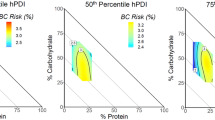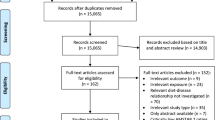Abstract
Laboratory data suggest that caffeine or some components of coffee may cause DNA mutations and inhibit tumor suppressor mechanisms, leading to neoplastic growth. However, coffee consumption has not been clearly implicated in the etiology of human postmenopausal ovarian cancer. This study evaluated the relationship of coffee and caffeine intake with risk of epithelial ovarian cancer in a prospective cohort study of 29,060 postmenopausal women. The participants completed a mailed questionnaire that assessed diet and health history and were followed for ovarian cancer incidence from 1986 to 2004. Age-adjusted and multivariate-adjusted hazard ratios were calculated for four exposure variables: caffeinated coffee, decaffeinated coffee, total coffee, and total caffeine to assess whether or not coffee or caffeine influences the risk of ovarian cancer. An increased risk was observed in the multivariate model for women who reported drinking five or more cups/day of caffeinated coffee compared to women who reported drinking none (HR = 1.81, 95% CI: 1.10–2.95). Decaffeinated coffee, total coffee, and caffeine were not statistically significantly associated with ovarian cancer incidence. Our results suggest that a component of coffee other than caffeine, or in combination with caffeine, may be associated with increased risk of ovarian cancer in postmenopausal women who drink five or more cups of coffee a day.
Similar content being viewed by others
References
American Cancer Society (2006) How many women get ovarian cancer?. American Cancer Society, Inc, Atlanta
Hankinson SE, Danforth KN (2006) Ovarian cancer. In: Schottenfeld D, Fraumeni JF Jr (eds) Cancer epidemiology and prevention, 3rd edn. Oxford University Press, New York
Trichopoulos D, Papapostolou M, Polychronopoulou A (1981) Coffee and ovarian cancer. Int J Cancer 28:691–693. doi:10.1002/ijc.2910280606
Byers T, Marshall J, Graham S, Mettlin C, Swanson M (1983) A case–control study of dietary and nondietary factors in ovarian cancer. J Natl Cancer Inst 71:681–686
Cramer DW, Welch WR, Hutchinson GB, Willett W, Scully RE (1984) Dietary animal fat in relation to ovarian cancer risk. Obstet Gynecol 63:833–838
La Vecchia C, Franceschi S, Decarli A et al (1984) Coffee drinking and the risk of epithelial ovarian cancer. Int J Cancer 33:559–562. doi:10.1002/ijc.2910330502
Tzonou A, Day NE, Trichopoulos D, Walker A, Saliaraki M, Papapostolou M, Polychronopoulou A (1984) The epidemiology of ovarian cancer in greece: a case–control study. Eur J Cancer Clin Oncol 20:1045–1052. doi:10.1016/0277-5379(84)90107-X
Miller DR, Rosenberg L, Kaufman DW et al (1987) Epithelial ovarian cancer and coffee drinking. Int J Epidemiol 16:13–17. doi:10.1093/ije/16.1.13
Whittemore AS, Wu ML, Paffenbarger RS Jr et al (1988) Personal and environmental characteristics related to epithelial ovarian cancer. II. Exposures to talcum powder, tobacco, alcohol, and coffee. Am J Epidemiol 128:1228–1240
Hartge P, Schiffman MH, Hoover R, McGowan L, Lesher L et al (1989) A case–control study of epithelial ovarian cancer. Am J Obstet Gynecol 161:10–16
Polychronopoulou A, Tzonou A, Hsieh CC et al (1993) Reproductive variables, tobacco, ethanol, coffee and somatometry as risk factors for ovarian cancer. Int J Cancer 55:402–407. doi:10.1002/ijc.2910550312
Kuper H, Titus-Ernstoff L, Harlow BL, Cramer DW (2000) Population based study of coffee, alcohol and tobacco use and risk of ovarian cancer. Int J Cancer 88:313–318 10.1002/1097-0215(20001015)88:2<313::AID-IJC26>3.0.CO;2-5
Tavani A, Gallus S, Dal Maso L et al (2001) Coffee and alcohol intake and risk of ovarian cancer: an Italian case–control study. Nutr Cancer 39:29–34
Goodman MT, Tung KH, McDuffie K, Wilkens LR, Donlon TA (2003) Association of caffeine intake and CYP1A2 genotype with ovarian cancer. Nutr Cancer 46:23–29. doi:10.1207/S15327914NC4601_03
Jordan SJ, Purdie DM, Green AC, Webb PM (2004) Coffee, tea and caffeine and risk of epithelial ovarian cancer. Cancer Causes Control 15:359–365. doi:10.1023/B:CACO.0000027482.00077.8b
Riman T, Dickman PW, Nilsson S, Nordlinder H, Magnusson CM, Persson IR (2004) Some life-style factors and the risk of invasive epithelial ovarian cancer in Swedish women. Eur J Epidemiol 19:1011–1019. doi:10.1007/s10654-004-1633-8
Baker JA, Boakye K, McCann SE et al (2007) Consumption of black tea or coffee and risk of ovarian cancer. Int J Gynecol Cancer 17:50–54. doi:10.1111/j.1525-1438.2006.00773.x
Song J, Kristal AR, Wicklund KG, Cushing-Haugen KL, Rossing MA (2008) Coffee, Tea, Colas, and risk of epithelial ovarian cancer. Cancer Epidemiol Biomarkers Prev 17:712–716. doi:10.1158/1055-9965.EPI-07-2511
Snowdon DA, Phillips RL (1984) Coffee consumption and risk of fatal cancers. Am J Public Health 74:820–823
Stensvold I, Jacobsen BK (1994) Coffee and cancer: a prospective study of 43,000 Norwegian men and women. Cancer Causes Control 5:401–408. doi:10.1007/BF01694753
Larsson SC, Wolk A (2005) Coffee consumption is not associated with ovarian cancer incidence. Cancer Epidemiol Biomarkers Prev 14:2273–2274. doi:10.1158/1055-9965.EPI-05-0280
Silvera SA, Jain M, Howe GR, Miller AB, Rohan TE (2007) Intake of coffee and tea and risk of ovarian cancer: a prospective cohort study. Nutr Cancer 58:22–27
Steevens J, Schouten LJ, Verhage BA, Goldbohm RA, Van Den Brandt PA (2007) Tea and coffee drinking and ovarian cancer risk: results from the Netherlands Cohort Study and a meta-analysis. Br J Cancer 97:1291–1294. doi:10.1038/sj.bjc.6604008
Tworoger SS, Gertig DM, Gates MA, Hecht JL, Hankinson SE (2008) Caffeine, alcohol, smoking, and the risk of incident epithelial ovarian cancer. Cancer 112(5):1169–1177. doi:10.1002/cncr.23275
Bode AM, Dong Z (2007) The enigmatic effects of caffeine in cell cycle and cancer. Cancer Lett 247(1):26–39. doi:10.1016/j.canlet.2006.03.032
Cavin C, Holzhaeuser D, Scharf G, Constable A, Huber WW, Schilter B (2002) Cafestol and kahweol, two coffee specific diterpenes with anticarcinogenic activity. Food Chem Toxicol 40:1155–1163. doi:10.1016/S0278-6915(02)00029-7
Bisgard KM, Folsom AR, Hong CP, Sellers TA (1994) Mortality and cancer rates in nonrespondents to a prospective study of older women: 5-year follow-up. Am J Epidemiol 139:990–1000
Pereira MA, Parker ED, Folsom AR (2006) Coffee consumption and risk of type 2 diabetes mellitus. Arch Intern Med 166:1311–1316. doi:10.1001/archinte.166.12.1311
Kushi LH, Mink PJ, Folsom AR, Anderson KE, Zheng W, Lazovich D, Sellers TA (1999) Prospective study of diet and ovarian cancer. Am J Epidemiol 149:21–31
McCusker RR, Goldberger BA, Cone EJ (2003) Caffeine content of specialty coffees. J Anal Toxicol 27:520–522
Bracken MB, Triche E, Grosso L et al (2002) Heterogeneity in assessing self-reports of caffeine exposure: implications for studies of health effects. Epidemiology 13:165–171. doi:10.1097/00001648-200203000-00011
Lee KJ, Jeong HG (2007) Protective effects of kahweol and cafestol against hydrogen peroxide-induced oxidative stress and DNA damage. Toxicol Lett 173(2):80–87. doi:10.1016/j.toxlet.2007.06.008
Terry KL, Titus-Ernstoff L, Garner EO, Vitonis AF, Cramer DW (2003) Interaction between CYP1A1 polymorphic variants and dietary exposures influencing ovarian cancer risk. Cancer Epidemiol Biomarkers Prev 12:187–190
Acknowledgments
The authors thank Aaron R. Folsom, MD, MPH for providing the Iowa Women’s Health Study data and Ching-Ping Hong, MS and Gretchen Cutler, MPH for assistance in data preparation prior to data analysis.
Author information
Authors and Affiliations
Corresponding author
Rights and permissions
About this article
Cite this article
Lueth, N.A., Anderson, K.E., Harnack, L.J. et al. Coffee and caffeine intake and the risk of ovarian cancer: the Iowa Women’s Health Study. Cancer Causes Control 19, 1365–1372 (2008). https://doi.org/10.1007/s10552-008-9208-8
Received:
Accepted:
Published:
Issue Date:
DOI: https://doi.org/10.1007/s10552-008-9208-8




